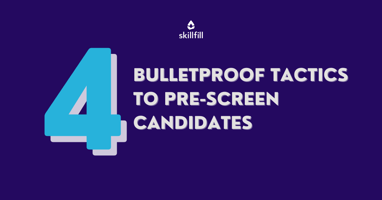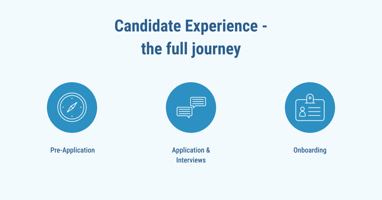Hiring new tech talent for your team is always exciting. It translates into a new opportunity to...
Uncovering the candidate's potential: interview with The Career Agent
Rory is the founder of The Career Agent, a company that provides career coaching and recruitment services, considering each candidate' skills, values, experiences, and applying those to the job market. Over the last four years, Rory has coached more than 300 people, and this week he sat down with us to take a closer look into The Career Agent’s mission and to give us his expert opinion about the HR trends for the upcoming months.
Hello Rory, please tell us about The Career Agent and what you do?
We offer career coaching to individuals and recruitment services to employers. We take an analytical approach to consider each candidate's motivation, to advise them based on their skills, values and experience, and the job market out there. What should they do with their career? What are their options? Then on the recruiting side, we work with SMEs to find candidates who are ideally as passionate as the founder or, who have a mission to build something and to be part of something. It's about working out someone's strengths and values, then helping them find the right environment to thrive in.
What are the main challenges in your job?
In an ideal world, every recruitment process should include a 1-2 week trial, to observe how the candidate gets on in the job. Of course, that’s rarely possible! Some candidates are great at interviews but the actual job doesn’t suit their skills. I think this is where we add value: to analyze each candidate; it’s what I'm most passionate about. Interviewing and understanding a candidate is hard and companies are generally not great at it .
Some people see their job as ‘just a job’, which is really sad because someone else out there would absolutely love their job. As a result, we tend to include tasks in our recruitment processes, to understand how interested a candidate is in our opportunity. That is why I find Skillfill’s approach very interesting. We can tell how passionate a candidate is by the way they interact with that task, do they do it quickly? How is their email etiquette when they respond? Those factors show you what the candidate is thinking. There are lots of clues that people will drop about whether they want this job or not. That's why I love it, it's like being a detective.
Another challenge is that recruitment has a bad name, everyone thinks that recruiters just throw out CVs and don't add any value. That is not always the case. Also, when a company is growing and scaling, they really benefit from having an external recruitment advisor. I was thinking about this for my business. I'd love to have a recruitment agency that gets to know me and how I work, about my strengths and certainly my weaknesses, and then bring me candidates who complement my skills and help my business to grow.
What would you say to a person undecided about whether to use a career coach?
We send them a form which asks some searching questions like “tell me about a good week at work”, “What would you like to do more of in your role?", "What would you like to do less of if you could?”, “what thoughts hold you back in your career?” and "what would you do if you were twice as bold?”
People take two or three days to think about it and they think, “This guy's asking me the questions I should be asking myself”. Then I speak to them, and I give them some ideas like “If you love talking to clients and you also have a passion for new things and new technologies, then a company like Skillfill is for you”. You can see where their heart is because it's like water and oil: they will keep coming back to the same things in terms of where their passion lies. The discussions are very tailored to their unique strengths. I don't sell at all, I just make them think. They walk away from the discussion having thought about their future and that normally does the job.
When you're hiring remotely, are most applicants domestically based or overseas?
It depends on the company's hiring policy. In the UK, Brexit has complicated things a bit. I've seen some complexity there, but it depends on how open the company is to these things. We try to encourage our employer clients to be more open.
Changing the subject slightly, we encourage them to be open to people who may not have all the experience and don't take every single box, but the vacancy is what they want to do in their life now. Using the English expression, they'll run through brick walls to get there. If it's what they want, if it's what they see as their Olympic gold medal, another cheesy analogy, then they'll learn the skills themselves. There needs to be more of that, companies hire people who are going to push themselves to learn. Being open to remote options is part of that. But again, you must find a candidate who earns your trust as well.
What you're saying also aligns with what Skillfill is building: a candidate does not need to check all the boxes because they didn't go to a specific school or took a certain class. For example, if someone was self-taught and they can perform the job with excellence and additional passion, they should also be considered for the position.
What you're saying is huge. If you have done an online course, or a part-time masters, you're showing your values. It's stamped on your forehead, what you care about and what you want to do.
Passion is twice as important as existing experience in my opinion. Without that passion, you are hiring someone who sees your role as ‘just another job’. We've published a case study recently about a business that hired a Maths teacher for a data scientist role. The candidate had been a teacher for 15 years, and had been putting herself through her qualifications, exercises, classes, etc. for nine months or so. All the other companies said, “No, you can't be a data scientist, you are a Maths teacher”. Until one company took the chance to interview her, and they understood: because she was a teacher, she was able to explain complex information in simple ways. Now, if you're a data science business, you present data and findings to your clients, making insights and recommendations that will help their business. In other words, she could sell things and communicate things in a simple way. She got the job. It's such a good example of thinking laterally and giving a chance to people who really want the opportunity.
So, when you're hiring, you don't feel the need to check all the boxes of the job description?
There's no hard and fast rule and it's always about finding a balance between experience and passion.
One of the big things every person needs in a job is where am I going with this? What's the next step? They have to know; where is this going? What am I building towards? What am I learning? What's the challenge? If a candidate has done the same job before and is moving to a similar role then where is the progression? Where are they moving up towards?
That's why it makes a lot of sense to look at someone who doesn't have all the skills but needs the job as part of their career vision. They’ve got the motivation. It is a balance though, there is no hard and fast rule because hiring someone without all the required skills is to some extent a risk. It's my job to explain why the risk is worth taking to each employer.
What do you think about CVs?
I think a carefully curated CV tells the story of someone’s career and the impacts they have made. Often however, CVs are not great because the person doesn't know how to sell themselves. Moreover, creating CVs and attending job interviews demand different skills than performing the job itself. And that's the problem.
That's where Skillfill adds value.
People also don't like to bring themselves up. In society, we are told our whole lives to be modest, to say “it wasn't me; it was the team. I couldn't have done it without the team etc.”. However, during job applications, candidates need to promote themselves, saying "this was the impact I made". As a result, people are not very good at writing CVs and that is also a problem. You might get someone who would be amazing at the job, but can't sell themselves.
Tasks can be of great help to address these problems. We say to our candidates “You’ve got to do a task and yes it's going to take some time, however it's a chance to show off what you can do.” A task is much more effective than an interview in my opinion. It's good on both sides: the company can have a look at how you work, and the candidate can show off what they can do away from the pressure of an interview.
It is crucial to let applicants show their true skills to the employer. On the recruitment side, how do you ensure that you don’t let elite talent slip through your fingers?
Great question. It is difficult if the CV isn't well written. What tends to happen is you see a CV with some good bits on it, and we'll give them a chance. We ask them questions like, Tell me about what you're most proud of at work. What makes you happy? If it's a sales job, you can ask what's your favorite deal you ever did? If it's a project manager, you say, tell me about your best project. Candidates come out with examples, and often include a lot of information that should be in their CV.
Why isn't that in the CV? This is one of the problems with CVs. People write their job description, what they were meant to do; instead of the impacts they made. They write “I was an accountant, and my job was to do this, this, this.” Instead of saying “I brought in a new system or I changed our process of doing x and y”.
A company hires a candidate for the impacts they made, not the description of the previous job.
What do you see as trends for 2023 in the recruitment and HR tech space?
It's interesting how Google or Facebook seemingly aren't trying to do things in this space because Recruitment is a huge challenge for every company. Technology is advancing, but tech alone is not enough, you need the people's side as well, because making an important life decision like changing jobs often needs a broker. I think if you can utilize the tech but also use empathetic recruiters in your processes, then you are onto a winner.
Find more about The Career Agent here.
ASSESS TECH TALENT BEYOND CVs
Start today your 14-day free-trial and identify the best tech talent to join your team.



